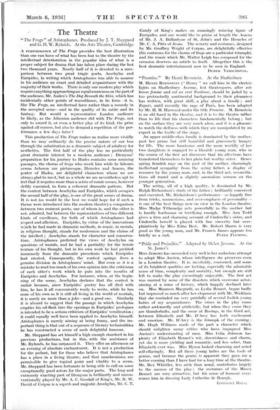MISS JEROME has succeeded very well in her audacious attempt
to adapt Miss Austen, whose intelligence she preserves even in a London theatre. It is, inevitably, coarsened, and some of its brightest qualities are lacking, especially the admirable sense of time, complexity and morality, but enough are still left to make the play exceedingly enjoyable. The first act was marred by some of the disasters which overcome actors aiming at a sense of history, which happily declined later on. Miss Maureen Maegrath, as Lydia Bennet, began badly but improved so much after her elopement with Mr. Wickham that she reminded me very painfully of several foolish young ladies of my acquaintance. The crises in the play come rather awkwardly and artificially, but when they come they are thunderbolts, and the scene at Rosings, in the third act, between Elizabeth and Mr. D'Arcy has both excitement and emotion. Mr. D'Arcy is the triumph of the evening ; Mr. Hugh Williams made of the part a character which should enlighten many critics who have impugned Miss Austen's understanding of men. Miss Celia Johnson has plenty of Elizabeth Bennet's wit, shrewishness and charm, yet she is more yielding and romantic, and less sober, than Elizabeth ever was. Miss Hyson looked charming and acted self-effacingly. But all these young ladies are the tools of genius, and because the genius is apparent they gave me a better evening than I have had for a long time at the theatre. Mr. Rex Whistler, less arch than usual, contributes largely to the success of the play : the costumes of the Misses Bennet are very attractive, but his sense of humour over- cOmes him in dressing Lady Catherine -de Bourgh. •
CORONWY.REES.
















































 Previous page
Previous page